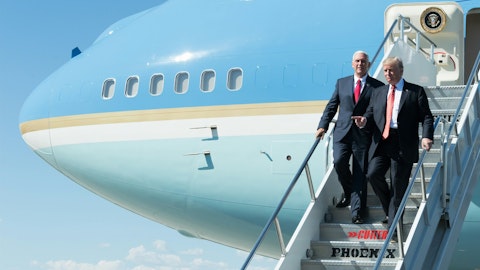Lachlan Murdoch: And I’d just remind you, it’s not only the value of the option, but also the equity that we have in Flutter, which is today worth over $900 million.
Operator: Your next question comes from the line of Ben Swinburne from Morgan Stanley. Please go ahead.
Ben Swinburne : Thanks. Good morning. Just sort of a question around kind of your products coming to market, the streaming JV and also maybe how Tubi might fit in, any more you can share with us on sort of what you think is really differentiated about the product? We haven’t seen it yet, you have. And I noticed in the Disney deck yesterday that it says that a definitive agreement hasn’t been signed yet. So, I didn’t know if there was something holding it up or if that meant anything or any update on sort of the go-forward plan and then I’m wondering Tubi with its reach as an app-based service, is that an opportunity for maybe bundling the JV product or merchandising and in some way, you have a pretty interesting direct customer relationship with Tubi. I know it’s a different kind of product offering. But I was curious if you thought about leveraging that asset or those two assets together to create more value for the company.
Lachlan Murdoch: Thanks very much, Ben. So first of all, as I said, I’ve got actually in the room behind me, I’ve got the beta version of the streaming app and I don’t think we’ve announced the name yet, so I won’t inadvertently do it on this call. I hope not yet anyway. And — but look, it’s something that we’ve been able to engage with, and it is really looking tremendously exciting, as I said in my comments. It’s very innovative. It’s designed to be entirely focused on the cord nevers, cord cutters, people who are not in the cable bundle. And we frankly can’t — won’t be able to compare it to a tier of live channels. It’s a very different digital-first product which I’m — when you eventually get it and get to enjoy it, you’ll understand how groundbreaking certainly in this country, it really is.
In terms of the speed, everyone are running at a sort of full pace to get the product finished and delivered. Obviously, there’s the fun side of it, which is like the user interface and how you use it, which has been great to use, but there’s a ton of work, obviously, in engineering behind that in ingesting content from multiple partners and being able to combine that into one sort of seamless platform. So, there’s a tremendous amount of work that’s being done to get them — to get us over the line this autumn but we’re incredibly excited. And so, there’s no — I wouldn’t read anything into a final deal terms being signed. It’s just a matter of everyone running on all cylinders to get this finished. So, on Tubi, sorry, the Tubi. We don’t see Tubi is a very different product.
We don’t see an opportunity at this stage or we haven’t contemplated an opportunity at this stage to bundle the sports service with Tubi. I think it makes potentially more sense to bundle sports with other SVOD services, which you’ll likely see as we go forward.
Operator: Your next question comes from the line of Jessica Ehrlich from Bank of America. Please go ahead.
Jessica Reif Ehrlich : A couple of questions. First, on political advertising. Lachlan, you seem pretty confident that it will come back. But I guess the question is really — will it come back to linear the way it has in the past and what’s your overall outlook. Second, on M&A, you may have the strongest balance sheet in the industry. So, I was just wondering if you could explore what opportunities you see out there. There seems to be a lot of things going on in the industry. And then finally, just a follow-up on Tubi, which has I mean such incredible momentum you’ve really pulled away from certainly all the other fast channels and competing with the big SVOD channels or network platforms. What does it look like over the next three years or so?
Lachlan Murdoch: Great. Thanks, Jessica. So on — let me start with political. We are confident — obviously we’re disappointed for multiple reasons that there wasn’t a more competitive primary season. But we certainly know this is an election which both sides of politics or all sides of politics are very focused on, have raised a tremendous amount of money, and that money will flow ultimately to local television. And we are extremely confident of that. One of the reasons we’re confident in addition to the amount of money that we know has been raised are just a position of our stations — specific stations within the group and how that aligns with the political map. If you look at the tight — so putting aside presidential election focused [ph] on a call to talk about sort of national trends and people focus on presidential.
But you have to look below presidential and look at sort of Senate races. So, we have tight center races in key markets where we have big stations. And you have to remember, Jessica, these are big new stations, right? And political money tends to run alongside news on local news. And so, there’s tight races in Arizona, in — these are presented in Michigan, ceratin Pennsylvania and in Wisconsin. And also, of course, our DC station will benefit from tight race in Maryland. In addition, you’ve got a lot of issues on the ballot in different markets. So, Arizona, Florida, I think Maryland again all have a lot of issue money flowing into those onto the ballot. So, we think it’s going to be an incredibly strong political season. We’re just starting later than we had first expected.





